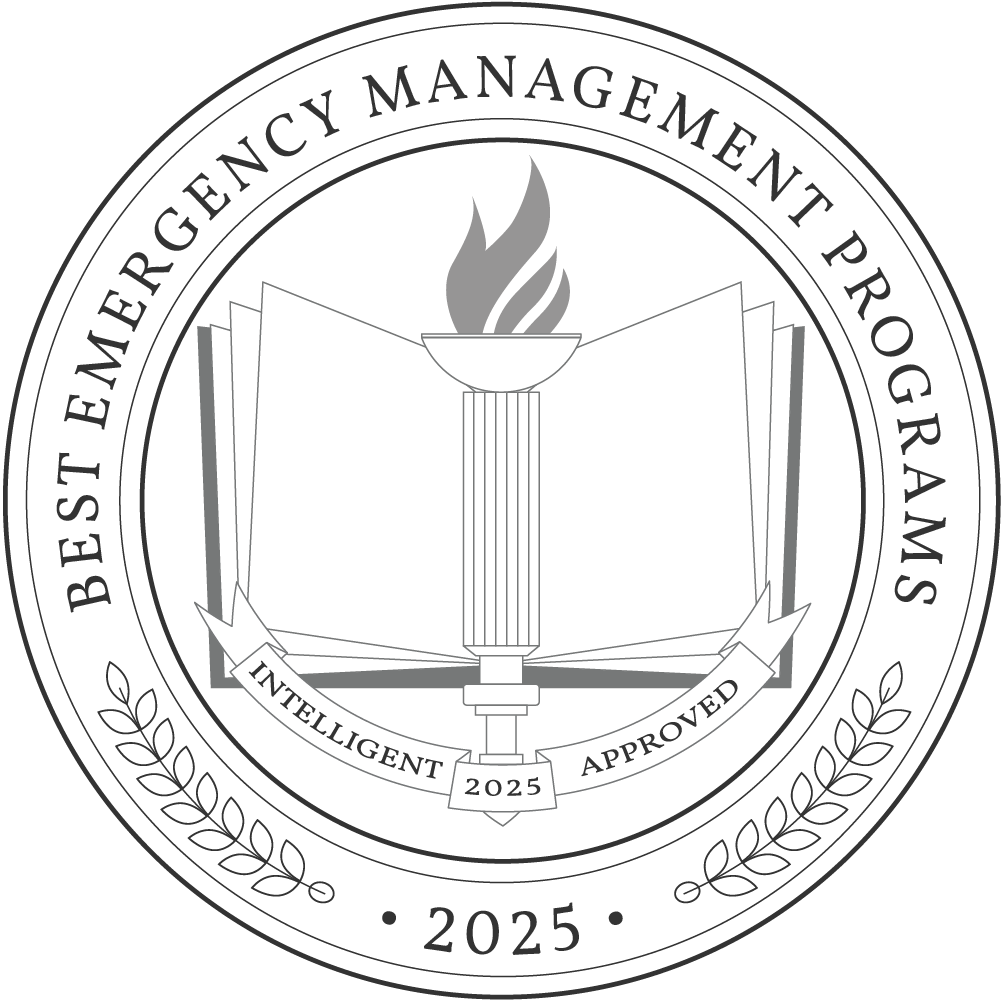After an emergency such as a natural disaster, terrorist attack, or other community devastation, emergency management professionals work to mitigate the damages and create a recovery plan. A degree in emergency management prepares students to work in these roles, with graduates hired as emergency management specialists, fire chiefs, emergency medical technicians, and intelligence analysts. The degree provides students with the leadership, organization, communication, adaptability, and technical skills required to succeed in these positions.
Emergency management directors earn a national median annual salary of $88,890. Salaries vary depending on the location, industry, position, and work experience. The median annual wage in California is $122,390, while in South Dakota it’s $62,110.
Emergency management degrees require between 60 and 180 credits to graduate. The total cost and length of the degree will depend on the program, institution, and student living requirements. A four-year full-time degree will cost $16,618 per year in tuition and fees. If room and board are required, students will pay an additional average of $12,415 annually.
Why Trust Us
The Intelligent.com Higher Education Team is dedicated to providing students with independent, equitable school and program rankings and well-researched resources. Our expert-driven articles cover topics related to online colleges and programs, paying for school, and career outlooks. We use data from the U.S. Department of Education’s College Scorecard, the National Center for Education Statistics, and other reputable educational and professional organizations. Our academic advisory team reviews content and verifies accuracy throughout the year for the most current information. Partnerships do not influence rankings or editorial decisions.
- Analyzed over 2,000 national, accredited, and nonprofit colleges and universities
- 800+ rankings pages are reviewed and updated yearly
- Content is informed by reputable sources, surveys, and interviews with academic advisors and other experts
- Over 100 data points are reviewed for accuracy and quality throughout the year, including sources
How we rank schools
Our list features the best Emergency Management degree programs at top colleges nationwide. Each school featured is a nonprofit, accredited institution — either public or private — with a high standard of academic quality for post-secondary institutions.
We evaluated each school’s program on tuition costs, admission, retention and graduation rates, faculty, reputation, and the student resources provided for online students. We collected data from trusted sources like the National Center for Education Statistics, individual school and program websites, school admissions counselors, and other data sources. Then, we calculated the Intelligent Score on a scale of 0 to 100 based on the following criterion:
Academic Quality:
- Admission rate versus enrollment rate
- Retention rate of students who return after year one
- Accreditation status (regional and programmatic)
- Nonprofit status, both private and public institutions
Graduation Rate
- Overall graduation rate
- Total number of currently enrolled students, including diversity metrics
- Student-to-faculty ratio
Cost and ROI
- In-state and out-of-state per-credit tuition rates and fees
- Required credits to graduate
- Earning potential after graduation
- Availability of federal student loans, scholarships, and other financial aid options
Student Resources
- Available student services for online-only and hybrid programs
- On-campus amenities like tutoring centers and the number of libraries
Read more about our ranking methodology.
Best 28 Accredited Emergency Management Programs
FiltersInstitution Type
Status
- Intelligent Score
- Alphabetically By University Name
- Acceptance Rate
- Enrollment
- In-state Graduate Tuition
- Out-of-state Graduate Tuition
- In-state Undergraduate Tuition
- Out-of-state Undergraduate Tuition

University of Alaska Fairbanks
Intelligent Score: 99.19In-state: $27,590
Out-of-state: $44,590
In-state: $29,182
Out-of-state: $29,182
SAT: 1110-1360
ACT: 17-27
Resident: $289
Non-Resident: $855
On-Campus, Online, Hybrid
Northwest Commission on Colleges and Universities
120

Drury University
Intelligent Score: 98.1In-state: $29,900
Out-of-state: $29,900
In-state: $8,388
Out-of-state: $8,388
SAT: 1030-1250
ACT: 21-29
$675
On-Campus, Online, Hybrid
Higher Learning Commission
124

Immaculata University
Intelligent Score: 97.73In-state: $26,900
Out-of-state: $26,900
In-state: $12,780
Out-of-state: $12,780
SAT: 990-1170
ACT: 17-23
$465
Hybrid
Middle States Commission on Higher Education
126

University of Nebraska Omaha
Intelligent Score: 97.49In-state: $7,770
Out-of-state: $24,900
In-state: $6,138
Out-of-state: $6,138
SAT: 1110-1320
ACT: 22-28
Resident: $243
Non-Resident: $764
On-Campus, Online
Higher Learning Commission
120

University of Central Florida
Intelligent Score: 97.23In-state: $4,478
Out-of-state: $19,810
In-state: $6,916
Out-of-state: $6,916
SAT: 1160-1340
ACT: 25-30
Resident: $212
Non-Resident: $749
On-Campus, Online, Hybrid
Southern Association of Colleges and Schools Commission on Colleges
120

North Dakota State University
Intelligent Score: 95.23In-state: $8,606
Out-of-state: $12,909
In-state: $7,013
Out-of-state: $7,013
SAT: 1028-1243
ACT: 20-26
Resident: $358 - $401
Non-Resident: $537 - $626
On-Campus
Higher Learning Commission
120

Rowan University
Intelligent Score: 94.95In-state: $9,573
Out-of-state: $18,605
In-state: $12,879
Out-of-state: $12,879
SAT: 1040-1250
ACT: 20-28
Resident: $432
Non-Resident: $813
On-Campus
Middle States Commission on Higher Education
120

Northwest Missouri State University
Intelligent Score: 91.41In-state: $5,106
Out-of-state: $11,064
In-state: $6,167
Out-of-state: $6,167
SAT: 990-1180
ACT: 19-24
Resident: $268
Non-Resident: $536
On-Campus
Higher Learning Commission
120

Elizabeth City State University
Intelligent Score: 90.6In-state: $14,673
Out-of-state: $18,673
In-state: $8,190
Out-of-state: $8,190
SAT: 850-1070
ACT: 16-22
Resident: $42
Non-Resident: $208
On-Campus
Southern Association of Colleges and Schools Commission on Colleges
120

Barry University
Intelligent Score: 90.31In-state: $30,600
Out-of-state: $30,600
In-state: $17,820
Out-of-state: $17,820
SAT: N/A
ACT: N/A
$1,050
On-Campus
Southern Association of Colleges and Schools Commission on Colleges
120

University of North Texas
Intelligent Score: 89.5In-state: $8,295
Out-of-state: $18,111
In-state: $6,350
Out-of-state: $6,350
SAT: 1050-1240
ACT: 20-27
Resident: $280
Non-Resident: $690
On-Campus
Southern Association of Colleges and Schools Commission on Colleges
120

Western Illinois University
Intelligent Score: 88.32In-state: $8,712
Out-of-state: $8,712
In-state: $8,156
Out-of-state: $8,156
SAT: 880-1090
ACT: 18-24
Resident: $326
Non-Resident: $490
On-Campus, Online
Higher Learning Commission
120

Northern Arizona University
Intelligent Score: 87.93In-state: $10,243
Out-of-state: $16,248
In-state: $10,309
Out-of-state: $10,309
SAT: N/A
ACT: N/A
Resident: $378
Non-Resident: $920
Hybrid
Higher Learning Commission
120

University of Akron
Intelligent Score: 87.5In-state: $9,596
Out-of-state: $15,500
In-state: $8,306
Out-of-state: $8,306
SAT: 990-1230
ACT: 19-25
Resident: $433
Non-Resident: $718
On-Campus, Online
Higher Learning Commission
119

Madonna University
Intelligent Score: 85.99In-state: $24,000
Out-of-state: $24,000
In-state: $16,200
Out-of-state: $16,200
SAT: 920-1110
ACT: 17-24
$760 - $855
On-Campus
Higher Learning Commission
120

Arkansas Tech University
Intelligent Score: 83.9In-state: $5,568
Out-of-state: $11,136
In-state: $5,256
Out-of-state: $5,256
SAT: N/A
ACT: N/A
In-State: $249
Out-of-State: $499
On-Campus
Higher Learning Commission
120

Western Carolina University
Intelligent Score: 82.91In-state: $1,000
Out-of-state: $5,000
In-state: $4,435
Out-of-state: $4,435
SAT: 1020-1220
ACT: 20-25
Resident: $308
Non-Resident: $475
On-Campus, Online
Southern Association of Colleges and Schools Commission on Colleges
120

Ohio Christian University
Intelligent Score: 82.88In-state: $14,400
Out-of-state: $14,400
In-state: $8,922
Out-of-state: $8,922
SAT: N/A
ACT: N/A
$795
On-Campus, Online
Higher Learning Commission
120
How to Choose an Emergency Management Program
Choose your area of study
Students pursuing emergency management can choose from four types of degrees: associate, bachelor’s, master’s, and doctorate. The degrees vary in their length of completion, cost, curriculum, and career prospects.
- An associate degree typically requires two years of full-time study or 60 credits for completion. It covers the fundamental knowledge of emergency management and prepares students for entry-level positions.
- A bachelor’s degree provides a thorough understanding of emergency management and often requires four years of full-time study. Due to the job requirements and skills, students interested in government or private sector positions will benefit from earning a bachelor’s degree rather than an associate degree.
- Most emergency management programs are offered as a master’s degree. To apply for a master’s program, students must have completed a bachelor’s degree. A master’s degree expands on the fundamental knowledge of undergraduate degrees and provides advanced skills required for specialized positions.
- A doctorate typically requires four years of full-time study and an educational and career background in emergency management to apply. It prepares students for advanced positions in emergency management, such as law enforcement and homeland security.
While completing an emergency management program, students can often choose a concentration that aligns with their future career interests. The most common specializations include public administration, fire science, child protection, disaster relief, and homeland security.
Research schools and programs
As you research schools and programs, look for those with accreditation. Accreditation is given to institutions that meet a set standard of quality and are widely recognized by employers and government agencies. It will assist when transferring credits, applying for jobs, and earning financial aid. You can use the Council for Higher Education Accreditation (CHEA) website to discover and filter institutions by accreditation.
The top emergency management degree programs are accredited by organizations such as the Higher Learning Commission (HLC), Southern Association of Colleges and Schools Commission on Colleges (SACSCOC), Middle States Commission on Higher Education (MSCHE), or International Fire Service Accreditation Congress (IFSAC). Completing an accredited program will benefit students in the competitive career search after graduation.
Prepare for tests and applications
To apply for an associate or bachelor’s degree in emergency management, you will generally be required to submit your most recent transcripts, SAT or ACT scores, and a personal essay. The requirements will vary depending on the school and program.
Master’s or doctorate programs often require the completion of a bachelor’s degree, GRE or GMAT test scores, a personal essay, letters of recommendation, and relevant work experience.
Before applying, speak with the school’s admission counselor. They’ll review the application with you and ensure you meet all the requirements.
Select your program
When making the final decision for your program, consider your educational goals, career objectives, and logistical needs, including:
- Options for full-time or part-time study
- In-person or online formats
- Synchronous or asynchronous classes
- Housing options
- Program length
- Tuition and fees
Select the program that meets your lifestyle requirements and offers the curriculum to prepare you for your desired career. If you need help narrowing down your choices, contact an academic advisor to review your options and find the best fit.
Determine how you’ll pay for your degree
Create a budget to determine whether you can fund your education on your own or need financial assistance. Add up your tuition, fees, housing, living expenses, supplies, and transportation costs.
Complete the Free Application for Federal Student Aid (FAFSA) to discover the amount of federal and need-based aid you’re eligible for, including grants, work-study funds, scholarships, and loans. Also, check if your prospective school offers tuition waivers for law enforcement and first responders or program-specific funding options.
Speak with a financial advisor to review your program’s cost and discover your financial aid options.
What Can You Expect From an Emergency Management Program?
An emergency management degree prepares students to respond to emergencies such as natural disasters, civil disorder, and hazardous materials accidents. The program covers a wide range of topics, including business planning, crisis communication, ethics, terrorism, and disaster risk management.
Students learn about the different kinds of emergencies and their psychological, social, and environmental impacts. They also study emergency response research, policies, and procedures, including short- and long-term plans.
Various learning methods are used, including lectures, exams, essays, field exercises, drills, and real-life simulations.
Potential courses you’ll take in an emergency management program
- Introduction to Emergency and Disaster Management. This course provides an overview of emergency and disaster management, including theory, history, major concepts, and terminology. It also identifies the roles, functions, and relationships of the organizations and agencies involved.
- Fire Services and Emergency and Disaster Management. Students learn about the role of fire services in emergency and disaster response, including their planning, protocols, and responsibilities.
- Cyber Terrorism. This course delves into the impact of cyber terrorism and cyber attacks. Students learn about the available responses and how to prevent, prepare, and mitigate these attacks.
- Incident Management Systems. Students will gain a basic understanding of incident management systems and learn about the application and issues of these systems in emergencies.
Emergency Management Degree Frequently Asked Questions
How do I apply to an emergency management degree program?
To apply for an emergency management program, visit the school website and review the application page. It will outline all required materials, such as transcripts, test scores, essays, and letters of recommendation that need to be submitted. Before applying, speak to an admissions counselor to ensure you meet the requirements and have the necessary documents by the established deadline.
How much does an emergency management degree cost?
The median annual cost for a bachelor’s degree in emergency management is $16,618. However, the total cost will vary depending on the student’s program, school, and living expenses. Students who choose to live on-campus will also need to include housing, food, transportation, and other living expenses.
How long does it take to earn an emergency management degree?
Depending on the type of degree, an emergency management program will require two to four years of full-time study. Most programs require students to complete between 60 and 180 credits to graduate. Some programs offer online or asynchronous classes so students can study at their own pace.

